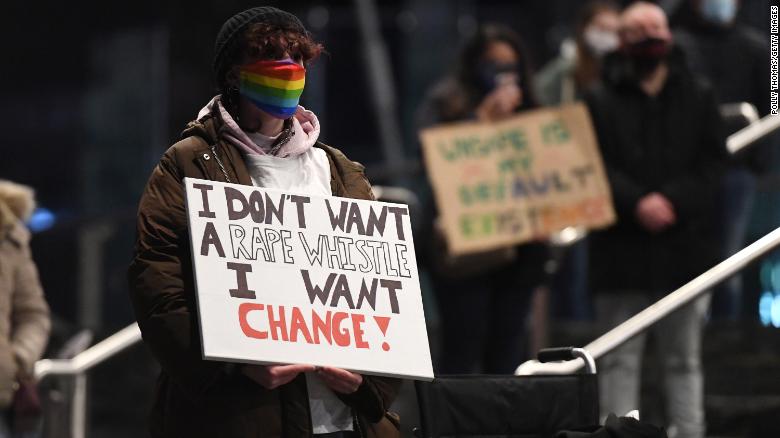London Campaigners have lost a challenge against the UK’s prosecution service over the dramatically falling rate of rape prosecutions, at a critical juncture for women’s rights in the country.
The UK Court of Appeal dismissed a case brought by women’s groups against the Crown Prosecution Service (CPS) on Monday over prosecution rates, which fell by 30% between 2018 and 2020.
The UK is currently facing a reckoning on gender-based violence in the wake of the murder of 33-year-old Sarah Everard earlier this month, and anger over the way that London police broke up a vigil for Everard on Saturday.
The case heard on Monday was originally brought before the UK High Court by the Centre for Women’s Justice and End Violence Against Women (EVAW) in early 2020. In a judgment delivered online, three of the UK’s senior judges concluded that “the summary of evidence deployed by the Director of Public Prosecutions undermines the grounds advanced by the claimant,” and scrapped the case.
The campaigners alleged that there had been a “covert” policy change in the way the CPS prosecuted rape cases, which led to the fall in the number of prosecutions.
Prosecution rates dropped by 30% between 2019-2020 compared with the previous year, according to CPS data. More than 55,000 rapes were recorded in 2019-2020 but only 1.4% resulted in a charge or summons, the CPS data said.
Director of Public Prosecutions Max Hill QC said that “rape in particular is an abhorrent crime and one of the most complex to prosecute,” and that the legal test that guides every decision to prosecute those cases “has not changed.”
“Independent inspectors have found no evidence of a risk-averse approach and have reported a clear improvement in the quality of our legal decision-making in rape case,” Hill said.
Part of EVAW’s evidence included a dossier of more than 20 recent cases that had been dropped by prosecutors for reasons they felt were unjust.
Bonny Turner, one of the women whose case was included in the dossier of evidence, told CNN: “I’m heartbroken. I feel as though the criminal justice system has been corrupted. I feel really gaslit by the whole situation … It’s abusive by the government, the state and the justice system.”
“They are giving the green light to men to rape, sexually assault with impunity,” Turner said, then referencing the government’s response to the outpouring of concern over the Everard case as an example.
“I don’t think there is any doubt to give them [the authorities] the benefit of. Especially in light of [the] kidnap and murder of Sarah Everard, when girls and women for eons have been saying we’ve not been listened to, when we’ve said how bad the situation is of male violence towards women and girls.”
On Saturday, Metropolitan Police officers forcibly removed women from a vigil for Everard and all women affected by and lost to violence. Attendees were dropped face down to the floor by officers, prompting a national outcry, the Mayor of London ordering an independent investigation of the events, and calls for the police commissioner to resign.
The dismissal of EVAW’s case also comes as the government says that it has been undertaking an “end-to-end” review of the criminal justice systems, which includes changes to the sentencing of serious and violent offenders, according to Home Office minister Victoria Atkins.
According to Atkins, the Domestic Abuse Bill, which is currently making its way through parliament, is “a landmark piece of legislation” that will start a “conversation about abusive behavior and what we can do to support victims, but also to tackle perpetrators.”Atkins said on Sunday that the government is also investing “unprecedented amounts of money” into perpetrator programs.
In a statement, EVAW said they were disappointed in the “narrow offer” being made in the bill, citing a “lack of commitment to guaranteed protection and advocacy for women despite the drive to increase reports to police.”
Speaking on the outcome of Monday’s decision, EVAW director Andrea Simon said the group was “deeply disappointed.”
“The Court of Appeal has given the CPS the benefit of the doubt, but we still lack alternative answers to why rape prosecutions have collapsed. This marks another establishment betrayal of victims of violence against women and girls,” Simon said.
>>>>


